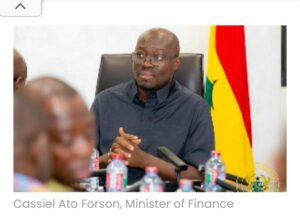Ghana Chamber of Mines Rejects GSL Increase, Calls for Balanced Narrative on Sector’s Contribution
 The Ghana Chamber of Mines has expressed strong concerns over the government’s decision to increase the Growth and Sustainability Levy (GSL) from 1 percent to 3 percent, stating that the justification for the hike misrepresents the mining industry’s true contribution to the national economy.
The Ghana Chamber of Mines has expressed strong concerns over the government’s decision to increase the Growth and Sustainability Levy (GSL) from 1 percent to 3 percent, stating that the justification for the hike misrepresents the mining industry’s true contribution to the national economy.
The government, in its 2025 Budget, argued that Ghana is yet to fully benefit from economic rents derived from its natural resources, particularly gold — whose global prices have risen significantly in recent years. However, the Chamber in a statement released this week, countered this position with data and historical context.
Some reports suggest that extractive sector rents represent 14 percent of GDP, while extractive sector revenue accounts for about 1.5 percent of GDP,” the Chamber noted. “These statistics cover the entire extractive sector, not just mining.”
Drawing on World Bank data, the Chamber clarified that mineral rents specifically averaged below 3 percent of GDP between 1990 and 2021, with figures ranging from 2.4 percent in 2015 to 5.2 percent in 2021. The Chamber stressed the need to distinguish between mineral rent — which is the excess revenue from extraction after all costs and investor returns — and mineral revenue, which includes gross earnings.
Mineral rent is a residual value and cannot exceed mineral revenue or have a higher GDP ratio,” the statement explained.
The Chamber further revealed that mineral revenue from its member companies accounted for around 8 percent of Ghana’s GDP in 2024, underscoring the sector’s significant impact. It also cited the Natural Resource Governance Institute (NRGI), which estimates that the government captures around 50–60 percent of mineral rent, contradicting claims that investors take an unfair share.
While gold prices have climbed, the Chamber pointed out that not all mining firms have reaped equal benefits. Companies involved in producing manganese and bauxite, for instance, have not experienced the same price boom as gold producers, yet they too will face the increased levy.
We’ve consistently raised concerns about the levy since its introduction and maintain our position following the rate hike,” the Chamber said, adding that it remains open to dialogue with the Ministries of Lands and Natural Resources and Finance.
The Chamber also reminded the public of Ghana’s past struggles when government ownership dominated the mining sector. It noted that during the 1960s and 1970s, nationalisation efforts through the State Gold Mining Corporation (SGMC) led to operational inefficiencies, resulting in a 60 percent drop in mineral production and 45 percent decline in mining employment by 1982.
This downturn contributed to the broader economic crisis of the 1980s,” it stated. The sector’s revival came through divestiture, investor-friendly reforms, and adoption of a lease-based royalty-tax system, which the Chamber says is still the global standard.
Although it welcomes discussions on alternative legal and fiscal frameworks, including greater state participation, the Chamber warned that any changes must be informed by the failures of past models.
Between 2020 and 2023, member companies of the Chamber reportedly spent an average of US$2.87 billion annually on locally sourced goods and services, while their tax contributions and corporate social investments averaged US$1.19 billion and US$32 million, respectively.
The Chamber emphasized that approximately 75 percent of mineral revenues were repatriated through local financial institutions, countering claims that investors retain most earnings offshore.
To improve transparency and ensure efficient use of mining revenue, the Chamber renewed its call for a mining-specific legislative framework similar to the Petroleum Revenue Management Act.
This would shine a spotlight on mining’s essential role in Ghana’s national development,” the statement concluded.
As the conversation around natural resource governance continues, the Chamber of Mines is pushing for a more balanced approach that reflects both the realities of the industry and its substantial contributions to the Ghanaian economy.
